COPWATCH.com
GET BACK AT YOUR LOCAL POLICE:
A COMPREHENSIVE GUIDE FROM COPWATCH.COM
HOW TO STAGE A TWO-PERSON MASS PROTEST
The following material describes an extremely effective protest method utilized by members of Copwatch.com.
NOTE: Under America’s current Police State policies, engaging in Constitutionally protected activities such as those described below may expose you to the possibility of being physically assaulted by the police, and/or arrested, and/or jailed. You may be forced to hire an attorney to defend yourself against criminal charges.
However, if you are jailed and/or injured by the police, you may be able to obtain monetary damages by suing the police for assault, false arrest, abuse of authority, and/or other civil rights violations.
This information is not intended to be taken as instructions, directions, or legal advice. You must consult with an attorney in your own jurisdiction to verify the applicability of this material to your locality.
OBJECTIVES OF THE PROTEST
- To communicate your political concerns to the public as effectively as possible;
- To direct the attention of interested parties to Copwatch.com for further information;
- To remain within the bounds of the law, so that the police do not have any valid grounds to arrest you;
- To create and preserve an admissible evidentiary record of the protest, so that you can a) protect yourself from the consequences of an unlawful arrest; and b) sue the police for any illegal conduct.
PERSONAL REWARDS OF PROTESTING
- The satisfaction of taking direct action against police misconduct;
- A sense of empowerment derived from obtaining public retribution against any specific officers who have done you wrong in the past;
- Focusing public attention on a specific issue or incident in which you are personally interested;
- Gaining the admiration and respect of your friends and associates in the Copwatch.com organization;
- Receiving a commendation from Copwatch.com, and public recognition on the Copwatch.com website.
SOCIETAL BENEFITS OF PROTESTING
- Proving to the public (and to the police) that the Police State is not immune to attack;
- Providing public confirmation that the Constitution is still the supreme law of the land, and that the 1st Amendment is still in effect;
- Informing the public of the myriad dangers posed by the police;
- Inspiring and encouraging other members of the public to voice their dissatisfaction with Police State practices;
- Focusing public attention on the Copwatch.com organization and objectives.
SYNOPSIS OF THE PROGRAM
Utilizing an auto-reverse tape deck, a pair of 100 watt PA speakers, a deep-cycle automobile battery, and a pre-recorded audio cassette, broadcast your concerns regarding police misconduct from a traditional public forum (preferably, the public sidewalks surrounding a massive pre-scheduled public gathering). Requires one person to operate the PA equipment and at least one person to document the event with a videocamera. This paragraph is a VERY abridged description of the protest method. For your own safety, do not engage in this activity until you have read this entire page.
IMPORTANT:
If your protest is motivated by any specific incident, or by any particular pattern of police misconduct, or by the actions of any particular officer(s) whom you would like to single out for public attention, you should provide us with a detailed explanation at least two weeks in advance of the protest. We will create a special section of the website devoted entirely to your issues, and provide you with a prominent platform from which your story will be presented to the critical eyes of the nation (and the world).
PRELIMINARY PREPARATIONS
If you prefer to err on the side of caution, you should retain an attorney to represent you in the event you are arrested. Coordinate your schedule with your attorney’s to ensure that he is not completely booked on the day you plan to protest. Verify that he will be available to consult with you in person or by telephone if you are jailed. (This step is recommended, but not required. Alternatively, you may, if charged with a criminal offense, rely on a public defender).
Using the same attorney, or another who seems sympathetic to the cause, verify that your proposed activities are legal. Give the attorney a letter which describes what you plan to do, (as outlined below). In the letter, ask him to provide you with a written analysis of the following matters:
- The legal risks you may face if you implement your plan, (e.g. your potential exposure to criminal charges and/or civil liability). The main legal issues will likely arise from zoning, noise, and/or nuisance ordinances (for example, there may be a prohibition on car-stereo systems that can be heard beyond a given distance. Or there may be a prohibition on any repetitive noise above a given volume between certain hours of the day). Ask your attorney to ascertain whether the applicable ordinances are content-neutral with respect to the noise they seek to ban, and whether the effect of the ordinance(s) is to unconstitutionally purport to ban all political speech. It is unlikely that any noise ordinances applicable to areas surrounding sports stadiums or county fairgrounds will be adequate to prohibit your protest.
- Also obtain from the attorney an estimate of the amount of bail necessary to secure your release should you be arrested and jailed for protesting. Have him determine if your jurisdiction allows bail to be posted with a credit card- if so, try to obtain a credit card with a sufficient credit limit.
- Determine whether it is legal to videotape/audiotape police officers in your jurisdiction.
- (Alternatively, you yourself may undertake the legal research required to ascertain the answers to the above questions).
SECONDARY PREPARATIONS
Select at least one partner who will remain trustworthy and steadfast in the face of dangerous and threatening circumstances. This is a military-style operation, and you cannot afford to place your freedom and safety in the hands of cowards, dummies, or dilettantes.
Make absolutely certain that neither yourself nor your partner(s) have any active wants or warrants.
Ensure that you will have immediate access to an amount of cash sufficient to post bail, and that someone will be available to bring those funds to jail at a moments notice (alternatively, be prepared to spend a day or two in jail if you are not released on personal recognizance).
Ascertain which jail you are likely to be brought to if you are arrested, and make sure that the person holding your bail money knows how to get there.
Ascertain which precinct station-houses you may be brought to prior to being booked into jail, and make sure that your attorney or a confederate knows the addresses and phone numbers of those precincts. If you are not booked into jail within a couple of hours of being arrested, your attorney or your confederate should make some phone calls to determine what’s going on.
SELECT THE LOCATION AND TIME OF THE PROTEST
We recommend that you stage your protest at a local community gathering spot, such as the public sidewalks and/or streets outside one of the following: an MLB baseball stadium, an NFL football stadium, an NBA basketball stadium, an NHL hockey arena, a county fairgrounds, or any other place and time at which tens of thousands of people are guaranteed to be present.
OBTAIN THE REQUIRED EQUIPMENT
A small karaoke machine capable of recording cassettes ($100.00
or less from any large electronics retailer). It will be used to record your message for public broadcast. (Alternatively, Copwatch.com will provide you with a customized, pre-recorded cassette).
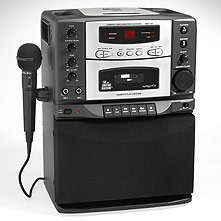
A cassette containing your pre-recorded message. We’ve found that a prerecorded cassette is infinitely better than a live speech because it prevents the cops from interrupting, distracting, or confusing you. Once you push “PLAY”, the protest is on “automatic pilot”. Your message will be endlessly and loudly repeated, while you are free to concentrate on and deal with the cops themselves. (At your option, Copwatch.com will provide you with a customized, pre-recorded tape).
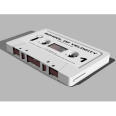
An auto-reverse tape deck, capable of delivering 50 to 100 watts per channel.
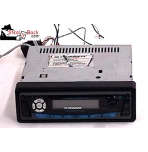
At least one PA speaker. We recommend this model (50 watts, $19.99) or this model (100 watts, $39.99) from Radio Shack. They are cheap and EXTREMELY effective. For best results, use two, three, or four speakers, each pointing in a different direction. In comparison, the traditional hand-held bullhorn, (running on D or C-cell batteries and maxing out at around 10 watts total), is completely useless.
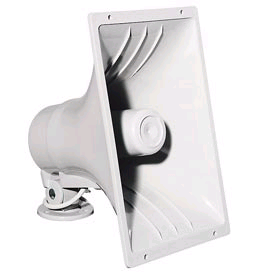
At least one camcorder.
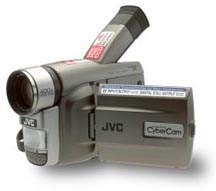
At least two cell phones, both equipped with hands-free ear-buds and belt clips.
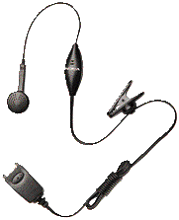
A non-digital answering machine capable of recording a single message of at least an hours duration (approximately $32.00. Search this site for Item # SWBFA936, with cookies activated)
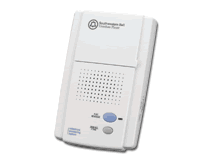
A sign or banner which reads as follows:
COPWATCH.com
Policing the Police
If you are going to conduct your protest on a public sidewalk, you should also obtain the following items:
A fully-charged, deep-cycle automobile battery (almost any such battery will run a 500 watt, 4 channel tape deck for 5 hours minimum). (i.e. four 100 watt speakers).

A used wheelchair (available for about $15.00 at your local thrift store).
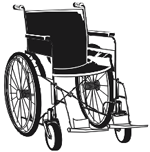
It is preferable, (and recommended) to augment the above equipment with the following optional items:
A sufficient number of camcorders so that you and all your confederates have one apiece.
OPTIONAL: A digital camera, so that pictures of the protest can be quickly emailed to us for publication on the Copwatch.com website.
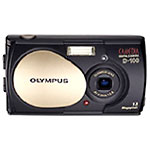
OPTIONAL: A wireless lapel microphone, ($100.00 or less), for one of the camcorders, with a range of at least 50 feet.

Additional/backup recording devices- one or more of your supporting videocamera operators should use one of these to record your activities:
- OPTIONAL: A camcorder-mounted shotgun microphone. (A directional microphone capable of isolating and recording conversations from a distance of 35’ or more).
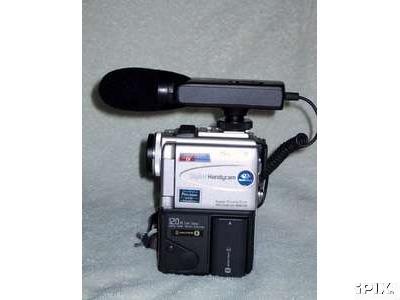
- OPTIONAL: A parabolic microphone. (A directional microphone that can isolate and record conversations from distances in excess of 300’). It may be possible to borrow or rent one of these from your local ornithological society or birdwatching club. Some commercial rental companies have them available as well.
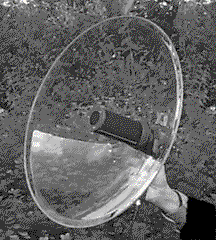
If your technical capabilities are sufficiently sophisticated:
OPTIONAL: Assemble a wireless internet pirate bandwidth access system, (and verify that the location of your protest is within the coverage area of an unsecured wireless network). Webcast a live video of your protest. Let us know if you will be doing this, and we can help arrange hosting to record the webcast.
NOTE: We have organized the ”Copwatch.com Inter-Member Lending Program” to facilitate equipment-sharing between members of Copwatch.com. Let us know if you have any specialized equipment that you are willing to loan or rent to other members of Copwatch.com. Conversely, if you are planning a protest, and would like to know if any equipment is available in your area, send us an inquiry.
PREPARE YOUR EQUIPMENT
Write a speech conveying your political concerns regarding the police. The speech can be any length you desire. (Copwatch.com will proofread and edit any speeches submitted to us. If you prefer, we will provide you with a customized pre-recorded tape).
Use the karaoke machine to record your speech onto a cassette tape (it will probably require a number of attempts before you are happy with the results). Be sure to frequently refer listeners to COPWATCH.COM for further information. Dub or repeat the speech until you have completely filled up both sides of the cassette. (If you prefer, COPWATCH.COM will provide you with a customized pre-recorded tape. Simply send us an outline of the issues which particularly concern you).
Connect the PA speaker(s) to the auto-reverse tape deck, and mount the speaker(s) in an appropriate manner.
Attach the COPWATCH.COM banner in an appropriate manner.
If you are using the wheelchair/sidewalk method, you must devise a suitable means of securing all these items (the deep-cycle automobile battery, an auto-reverse tape deck, the PA speaker(s), and the COPWATCH.COM banner) to the wheelchair (while still leaving room for someone to sit in the chair).
TEST YOUR EQUIPMENT
When you have prepared and installed this equipment, take your vehicle to a large, sparsely occupied area (such as a university parking lot on a weekend), and verify that everything will work according to plan.
a) Ensure that the speaker(s) will not fall off while the vehicle is in motion;
b) Ensure that the banner will not blow away or obscure your vision while driving (we recommend that you turn the banner so that it is facing your vehicle when conducting this test- there’s no sense attracting premature attention);
c) Ensure that the speaker(s) function properly (we recommend that you test the speakers using an inoffensive music cassette rather than your speech);
You should also test your cell phones and your answering machine. You must go to your planned protest area to conduct this test, so that you are 100% certain that your cell phones have adequate reception at that location.
We recommend that you use a small, cheap, hands-free cellphone earbud, rather than a fancy headset, since the earbud microphone is easier to conceal. With the cellphone attached to your beltclip, run the earbud wire up the inside of your shirt to your collar, and clip the microphone there. Leave the earbud portion dangling inside your shirt.
Dial your answering machine, and then engage in a normal conversation with someone standing nearby.
Verify that your answering machine has recorded both sides of the conversation.
NOTE: If you live in a jurisdiction which prohibits you from surreptitiously recording law-enforcement personnel, it might be illegal to engage in this activity. However, in order to be convicted of this offense, the cops would have to 1) notice that you were on the telephone; 2) use a reverse directory to determine the address of the telephone number you had dialed; and 3) obtain a search warrant for that address. The latter would probably be hard to do, since they would have no proof that the conversation was being recorded rather than merely overheard.
Obviously, we cannot and do not advise you to break the law.
If asked at the scene, you should neither admit nor deny that you were recording the police in this manner. Nor should you admit or deny that you were even aware that your telephone was activated. There’s no sense in giving them such information up front. You can determine at your leisure how best to use the recording.
If you want to further complicate matters, you could arrange to have the answering machine located in a state where it is legal to record the police, such as Washington State.
The purpose of creating a remotely-located record of events is to ensure that the police are not able to destroy the tape. It is very possible that they might “accidentally” destroy any videotape or audiotape on your person.
If you have acquired a wireless lapel microphone for use with a camcorder, you must test it as well. As with your cellphones, the microphone must be tested at the location of your planned protest to ensure that conditions there do not interfere with reception. Attach the microphone to the inside of your lapel, and run the wire down the inside of your shirt to the transmitter on your belt. Attach the receiver to a camcorder, and have your partner stand some distance away, videotaping you while you engage in a normal conversation with someone standing next to you. Determine the maximum distance at which the microphone will operate properly, and impress upon the camera operator that he must always stay within that range.
If you are using the wheelchair/sidewalk method, you must test the wheelchair to ensure that everything is securely attached and properly wired.
BROCHURES AND LEAFLETS
It is crucial that you pass out leaflets to interested members of the public. Don’t take the time to engage in a lengthy debate with every person who approaches you- simply hand them a leaflet containing all of the vital Copwatch.com statistics, data, information, and objectives. (We will provide you with a customized brochure upon request).
NOTE: Videocamera operators should not be bogged down with leaflets, since they need to devote their full concentration to videotaping.
The rest of your protestors should each have a supply of leaflets. It is a good idea to carry the leaflets in a bag attached to your waist, so that your hands remain free to carry your sign and deal with exigencies.
SIGNAGE
Homemade signage can easily be created from a wide variety of suitable materials. For example: neon posterboard can be purchased at any large drugstore for around .89 cents a sheet. Use a full-size felt-tip indelible pen to write the message on the posterboard. Tape or glue the posterboard to cardboard backing (appliance sales stores often have refrigerator boxes available). Repeat this process so that you end up with two equal-sized signs. Place the two signs together, facing out, and insert a handle between them (a thin wooden lathe, a small diameter PVC pipe, a cardboard tube, etc). Tape and glue the two signs together, and affix the handle using plastic zip-ties, staples, epoxy, hot glue, duct tape, or etc. Make sure that your sign is sturdy and durable enough to last through the protest. Another excellent sign material is Coroplast (a corrugated plastic material resembling cardboard). It is widely available at sign shops, and has the advantage of being impervious to adverse weather conditions.
NOTE: Camera operators should not be bogged down with signs, since their hands must be free at all times to operate the camera and microphone.
We highly recommend that you avoid using clichéd slogans such as “No Justice, No Peace”, (a phrase which has become anathema to the average American due to its association with that self-aggrandizing, self-serving hypocrite Jesse Jackson).
ISSUE PRESS RELEASES
You should fax a press release to local media outlets the day before the protest. The press release should contain the following information:
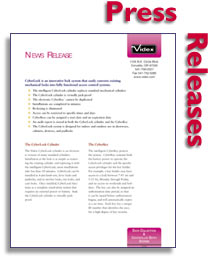
- The purpose of the protest (i.e. to foster accountability within the police department, destroy the “Blue Wall of Silence”, impose stricter punishments against bad cops, and ENACT ALL THE REFORMS RECOMMENDED BY COPWATCH.COM);
- The fact that the protest is affiliated with Copwatch.com;
- The date, time, and location of the protest;
- The estimated number of participants (feel free to exaggerate- for all you know, there may be dozens or hundreds of protestors);
- You should also inform the press that you will hold a press conference at a specified time just prior to the protest.
Your press release should be sent to every press organization in your town: university newspapers, alternative newspapers, mainstream papers, radio stations, television stations, potentially interested radio talk-show hosts, community-college newspapers, etc. (Copwatch.com will edit/proofread your press release. If you prefer, we will write the press release for you).
NOTE: You should also send the press release to any local organizations which may be sympathetic with the purpose of your protest, such as African-American churches. Be sure to give them a weeks advance notice, so that potential participants can mark their calendars.
On the morning of the protest, call and remind all these organizations that your press conference will be held at the stated time, and will be immediately followed by the protest.
FINAL PREPARATIONS
- Divest yourself of all extraneous items (knives, guns, drugs, other contraband, jewelry, wallet, money, house keys, electronic organizers, etc). Do not leave any of these items in your vehicle, either. If you are arrested, items on your person or in your vehicle may be seized and held by the police as “evidence” for an indeterminate length of time (even if the police have no right to do so). Additionally, the police will probably steal any money you have in your possession, and they will probably search through your wallet or purse and make copies of any personal information they find interesting. Aside from the equipment listed above, the only items you should retain are your driver’s license and your credit card (assuming that your jurisdiction allows bail to be posted with a credit card).
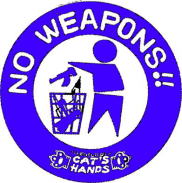
- If you’ve programmed your cellphone with the names and telephone numbers of friends and associates, you may want to put a password-restriction on your phone, or erase the listing of anyone who has a criminal record, or is a drug dealer, or is a gang member, since it is likely that the cops will search through these numbers if you are arrested, and attempt to classify you as a “known associate” of unsavory elements.
- Make sure that you are not under the influence of any intoxicating substances.

- If you are in a vehicle, make sure that it is a) properly licensed; b) insured, if required; c) street-legal; and d) free of any contraband whatsoever (be sure to check under the seats in case you’ve forgotten what’s there).
- Ensure that you have memorized or otherwise recorded (by writing in indelible ink on your arms, NOT your hands—palmprints will likely be taken if you are arrested), all of the telephone numbers which you may desire to call if you are jailed. You will not have access to your cell phone in jail, and if you have programmed all of your frequently-called contacts into your cellphone, it is possible that you may not be able to recollect the numbers when the need arises.
- Make sure that your cellphone bill is not overdue, so that your service will not be interrupted at an inopportune moment.
- Make sure that your cellphone battery is fully charged.
- Make sure that your camcorder batteries are fully charged, and that you have at least 2 empty videotapes. OPTIONAL: You may want to purchase an extra-capacity camcorder battery to be certain that you don’t run out of power at a crucial juncture.
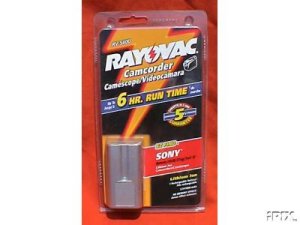
TAKE ACTION
1) WHEELCHAIR METHOD: While playing the tape at high volume, push the wheelchair along the public sidewalks adjacent to the venue as the crowd flows past. Ideally, one of your compatriots should be seated in the chair while you push it around. Observers will assume that your compatriot was injured by the police, (providing an obvious explanation for your protest), and your compatriot will be in a perfect position to operate a videocamera.
2) VEHICULAR METHOD: Drive around the perimeter of your selected protest area while the crowds are arriving, playing your pre-recorded tape at a volume which ensures that people on the sidewalks can easily hear your message. It’s a good idea to tape a spare cellphone earbud to the interior of your car, just inside the driver’s-side window, so that you can record the cops when you get pulled over.
IMPORTANT CONSIDERATIONS AND “BEST PRACTICES”
- The entire operation must be videotaped by yourself or a trusted associate.
- It is vastly preferable to have two or more cameramen on the scene, each being progressively further away from you. Initially, both of them will videotape both you and any approaching cops. If the cops accost any given cameraman, the other cameramen will continue to film both the first cameraman and yourself.
- Ideally, each cameraman should have an extra videocassette and be accompanied by a runner. If any cameraman begins to suspect that the cops will make an imminent attempt confiscate his videocamera, he should give the tape he’s already recorded to his runner, who will quickly depart the area and carry the tape to safety. The spare tape should then be inserted into the camera, and taping continued until the action is completed, or until the cops physically seize the camera. The use of a runner is extremely important, since, if given the chance, the cops will confiscate the tape for “evidence” and will probably erase the tape if it makes them look bad. You must make every reasonable effort to ensure that the cops do not capture the tape.

- All participants in the operation should have cell phones with hands-free ear buds. (OPTIONAL: Walkie-talkies may also be used, if equipped with hands-free earbuds).
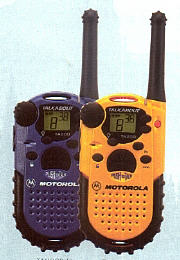
- OPTIONAL: It can be helpful if your cellphone is capable of three-way conference calling, so that one line can be connected to your answering machine, while another line is connected to your partner.
- OPTIONAL: It can be helpful if another compatriot is equipped with a police scanner to monitor and/or record the cop’s response to your protest, so that they can a) warn you if any worrisome responses are being discussed, and b) determine if the cops engage in or plan any misconduct over the airwaves.
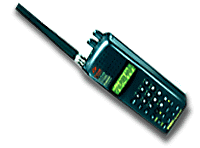
STRATEGIES, TACTICS, AND BEHAVIORAL RECOMMENDATIONS
IN GENERAL:
- You are under no obligation to answer any questions posed to you by the police. As a general rule, you should NEVER provide ANY information in response to ANY of their inquiries. (For example, the cops might ask if they “can talk to you”, or if they “can ask you a few questions”). We recommend that you respond by saying, “NO! My attorney has advised me not to speak with you.” If you do voluntarily answer their questions, then the resulting conversation is considered to be consensual, and you have no legal recourse against them.
REMEMBER- In this context, (as in most contexts), the police consider you to be “the enemy”. No matter how reasonable, sympathetic, or friendly they sound, it’s all just an act- their real objective is to find an excuse to arrest you. Any time you voluntarily talk to them, you make it easier for them to achieve their objective.
- Similarly, you are under no obligation to voluntarily cooperate with any other type of request made by the police (such as a request to remain in place, or a question such as “do you mind if I search your car”). Again, as a general rule, you should NEVER cooperate with ANY of their requests. Above all, you should NEVER grant them permission to do ANYTHING to you or your possessions. If you do give them permission or cooperate with their requests, then the encounter is considered to be consensual, and you have no legal recourse against them. You must always make clear to any witnesses (and to the cameras), that the encounter is NOT consensual or voluntary. (However, once it is established that you are being ORDERED to comply, you should not resist or refuse to cooperate- the risks of serious bodily injury are too great).
REMEMBER- Withholding your consent and refusing to voluntarily cooperate with mere requests will not prevent the police from doing what they want to do, but will provide you with a potential basis to sue them or to exclude any “evidence” they discover.
- As a general rule, when dealing with the cops you should remain as polite as possible, and talk as little as possible. Do not let the police bait you into an argument, since it rarely ends up sounding sympathetic on tape. You will NEVER convince them that you are right, (even if they pretend to agree with you), and you will be distracted from your mission.
REMEMBER- Trying to talk rationally with the cops is a classic example of “casting your pearls before swine.”
- Never touch or bump an officer, since they will charge you with “assault” at the drop of a hat, and may use the contact, whether intentional or not, as a transparent excuse to beat you as well.
- If they physically grab you, do not resist, as they will use any resistance as an excuse to beat you.
- If your arrest appears imminent, advise the police to call a commanding officer to the scene before they commit a false arrest for which they will be sued. (In our experience, rank-and-file police officers are usually uninformed, uneducated idiots who are used to arresting people for any reason they like. They rarely understand the law or the Constitution. We’ve generally found that commanding officers are somewhat better informed, if no more intelligent).
- It is possible that the cops may decide to frisk you as an excuse to separate you from your videocamera. If they do so, do not resist, but make clear on camera that you are not voluntarily consenting, submitting, or cooperating. As soon as they have completed the frisk, demand that you be given back your videocamera. Eventualities such as this are one reason why it is very important to have additional cameramen some distance away who are able to capture such events on tape, and another reason why it is important to record the events on your answering machine (so that you have a record showing that you did not make any threats).
- Do not behave in an aggressive or threatening manner. Do not make any verbal threats. Do not become angry. Stay calm and rational at all times. In other words, do not give them ANY excuse to beat you up or take you down to the pavement. If they do so anyways, the situation will be captured on videotape, and you can sue them.
STANDARD PROCEDURE to follow when you are approached by the police:
- Ask each of them for their first and last names.
- Ask each of them for their badge number.
- Ask each of them for their rank.
- Ask each of them for the name of their supervisor. Rather than writing all this information down, or trying to memorize it, you should record it on videotape, AND simultaneously record their responses on your answering machine via your cellphone earbud. (In any event, you must somehow make a permanent record of this information).
- Politely state that you do not want to speak with them, and then cease talking and move away from them.
- If they prevent you from leaving their vicinity, you have been “seized”, which is potentially an actionable offense. To confirm that you have been seized, say to them, “I would like to leave your vicinity right now. Am I free to go?” You must make sure that your inability to leave is clearly demonstrated in some manner; either by a direct order, or by physical restraint. Do not comply with a simple “request” to remain where you are. If the situation is unclear, ask them if you are being requested to remain, or ordered to remain. If they refuse to let you move away,
- Tell them that you are a member of Copwatch.com, and that you are exercising your free-speech rights under the 1st Amendment to the US Constitution. Tell them that their activities are being videotaped, and that a complete account of the entire incident will be published on the Copwatch.com website. If they refuse to let you go,
- Ask them if you are under arrest. In all likelihood, they will have to admit that you are not under arrest. If they still refuse to let you go,
- Ask them to state the specific basis for your detention.
- If it seems appropriate, inform the police that you are going to call your attorney on your cell phone before you say anything more to them.
Supplemental Procedure to follow if they ask you to turn off your videocamera:
- Ask them if they are requesting that you turn off the camera, or ordering you to turn off the camera (to reiterate, you should never voluntarily comply with any “requests”). If they say they are ordering you to turn off the camera, ask them to
- Cite the specific statute which grants them the authority to issue such an order.
- If they continue to threaten you with jail, you have the choice of standing on principal and going to jail, (which may give you the right to sue them for monetary damages), or of complying with their demands.
Supplemental Procedure to follow if they ask you to identify yourself and provide photo ID:
- Tell them that they have no basis to ask for your identification, and that you do not want to provide them with your ID. Do not voluntarily provide them with your identification in response to a simple request.
- If they persist in requesting your ID, ask them what basis they have for making that request.
- Ask them to cite the specific law they claim you are breaking, and to describe what you have done that gives them probable cause to demand that you identify yourself.
- Ask them if they are ASKING you to provide your identification, or ORDERING you to provide your identification (again, you should never comply with mere requests);
- If they say that they are ORDERING you to identify yourself, tell them that such an order:
a) violates your First Amendment right not to speak; and
b) violates your Fifth Amendment privilege against self-incrimination; and
c) violates your right to due process under the Fourteenth Amendment; and
d) violates the Fourth Amendment’s prohibition on unreasonable searches and seizures. Do not allow yourself to be drawn into an argument with them when they say you are wrong- simply say that you are repeating what you were told by your attorney (assuming that to be the case).
Supplemental Procedure to follow if they ask you to turn off or turn down your pre-recorded protest tape:
- Ask them to cite the specific law which gives them the authority to issue such an order.
- If your attorney has provided you with a favorable written analysis of this issue, you may give the cops a copy of the letter, and tell them that you have confirmed that your activity is legal.
- If you are confident that the law is on your side, then you may decide that you would prefer to be arrested and jailed rather than comply with their demand.
PROPS (OPTIONAL)
Props may be used to facilitate your protest. For example, an ordinary toilet plunger serves as an instantly identifiable symbol of the horrific case of Abner Louima, who was sodomized with a plunger by members of the NYPD. (Paint the end of the handle dirty-blood-red for a gruesomely realistic effect).

ATTIRE AND COSTUMES (OPTIONAL)
- It is a good idea to dress nicely for your protest. Like it or not, society judges people on appearances, and if you appear respectable and professional, you are deemed to be credible and responsible. The police are extremely class and status conscious, and are often more hesitant to mistreat someone who is dressed nicely than someone who is dressed poorly. If you wear a button-down shirt, a sportcoat, a tie, and slacks, you will be treated more deferentially than if you wear jeans and a t-shirt (women should consider wearing dresses and nylons).
REMEMBER- The purpose of your protest is to attack the problem of bad cops, not to show contempt for the old adage that “clothes make the man”.
- If you don’t want to dress like a yuppie, then consider wearing an suitable hat to compliment your street clothes and give you a distinct identity. We suggest that you choose something symbolic, like a Statute of Liberty hat, an Uncle Sam hat, a Tri-Corner hat, or a coon-skin cap.



- You can also purchase a cheap plastic mask, if you would prefer to remain somewhat anonymous.


- One of the most complex, imaginative, and humorous options we’ve ever seen for dealing with invasive authority figures is the one-of-a-kind “PLEASE WAIT” helmet/mask. (As with all the images on this page, if you place your mouse-pointer over the image, additional text will soon pop up).
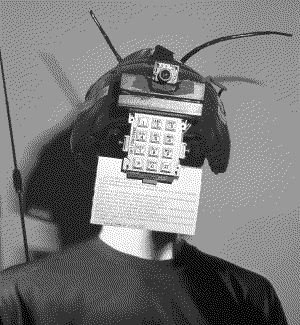
- For a full-fledged theatrical impact, wear a complete costume.


- For the ultimate in no-compromise confrontation gear, wear a Copwatch.com t-shirt. As an attention-getter (and a graphic reminder of the cops’ penchant for shooting first and asking questions later), some people like to paint bloody bullet-holes in the fabric.
UNIT COHESION AND PUBLIC IDENTIFICATION (OPTIONAL)
If there are numerous participants in your protest, it is a good idea to ensure that both the public and the police can easily ascertain that you are all part of the same movement. This provides you with greater protection and greater credibility. In addition, it helps to camouflage those members of your protest whom you want to remain unnoticed (such as videocamera operators). You should try to make sure that all of your protestors (except for the camera operators) have a sign, or a prop, or a costume. Alternatively, you can make armbands or sashes for your protestors to wear. (A roll of shiny 3 inch ribbon from your local .99 cent store is perfect for making armbands and sashes- just write “Copwatch.com” on the ribbon, and attach).
PUBLIC PARTICIPATION AND INTERACTION (OPTIONAL)
If you have a sufficient number of protestors (e.g. ONLY if you have first secured multiple redundant videocamera operators), you can try to foster personal interaction with the public. One good way to do this is to assign two members of the protest to work together in conducting a “Public Opinion Poll”. The poll should be pre-printed, and consist of a number of questions with multiple-choice answers. We will provide you with a customized public opinion poll upon request.
Another option is to solicit signatures on a petition. We will provide you with a customized petition upon request.
MISCELLANEOUS MATTERS
- Be aware that some members of the public may oppose your views regarding the police. You should be on the lookout for the odd citizen who may behave in a belligerent manner.
- The more participants in your protest, the better. However, it is not a good idea to allow anyone whom you do not know personally to assume a vital role. For example, you are much better advised to select as your camera operator someone whom you know and trust implicitly, rather than relying on an unknown volunteer. On the other hand, you can feel comfortable if a new acquaintance simply wants to carry a sign and hand out leaflets. Having emphasized this point, Copwatch.com will, at the option of protest organizers, endeavor to inform selected individuals of upcoming protest dates in their area. Alternatively, (again at the option of protest organizers), we will post details of upcoming protests on the front page of the website.
- As mentioned above, it is very important to have multiple and redundant audio-visual recording capabilities. The police monitor this site very closely, and they will familiarize themselves with the tactics and strategies discussed above. When confronting a protestor, they may attempt to immediately disable the protestor’s on-person recording systems. It is crucial that any such actions be remotely recorded and preserved, both visually and aurally.
- We will provide you with additional assistance on an individual basis. Contact us for more details when you are ready to move forward.
ALTERNATIVE PROTEST OPTIONS
- During rush hour, stand on a freeway overpass holding a large sign promoting Copwatch.com. (Requires at least two people and a videocamera).
- At the beginning and the end of court hours, stand outside your local courthouse holding a large sign promoting Copwatch.com. (Requires at least two people and a videocamera).
- Place an advertisement for Copwatch.com in your school newspaper (this can be done very cheaply). If they refuse to run the ad, it may enable you to obtain even more free publicity.
Get your message out! Take action now! Send us pictures, videos, and a written description of your experience.
We are continuously soliciting tips and suggestions for increasing the effectiveness and lowering the risks of a protest. Submit your ideas here.
All content Copyright © 2000, COPWATCH.com, Inc.
A non-profit organization.
All rights reserved.
May not be duplicated or reproduced without prior written permission.
COPWATCH.com home
copwatch@lokmail.com
COPWATCH.com DISCUSSION FORUM
Help copwatch fight police brutality. Bad cops must be prosecuted. Police corruption is a major problem - copwatch will root it out. Dirty cops threaten the criminal justice system. Police misconduct is an epidemic. Police abuse innocent citizens all too often. Police harassment is a frequent occurrence. The blue wall of silence protects bad cops, and police culture must be reformed. Deviant cops must be fired. Police deviance cannot be tolerated. Last year saw a bad cop arrested for rape, a dirty cop charged with extortion, police corruption involving drug distribution, a criminal cop jailed for brutality, a disgraced police chief sentenced for domestic abuse, a convicted sheriff guilty of theft, moonlighting police disciplined for misconduct, convicted cops fired for sexual assault, a guilty cop suspended for harassment, a discredited cop charged with perjury, and a law enforcement officer suspended from duty for being on the take. Police corruption is common across the country. Such activities are a disgrace to the badge, and dishonor the uniform, so the offending cop was forced to turn in his badge. Subsequent reports revealed a state patrol officer investigated for arson, a highway patrol officer indicted for fraud, a state trooper jailed for assault, a top cop ousted for brandishing his weapon, a Police Sgt. fired for bribery, (while another Police Sergeant quit the force), a Police Lt. pressured to resign (the Lieutenant is accused of murder), child-molesting police, and a Police Commander crashed his squad car in a high speed pursuit. The police department engaged in a coverup to hide evidence of misconduct, refusing to release relevant public records and public documents, despite the open records law and the submission of a public disclosure request. Finally, Serpico breaks ranks. As the bad cops close ranks, good police put their lives on the line, while an overzealous county mounty (or mountie) is an embarrassment to the force. An ex-cop turns in his gun. Learn how to prevent police brutality. The Police Benevolent Fund manufactures support for the police department - a department under fire amid accusations of misconduct. The Police Guild negotiates a new contract for its members. The Police Union demands raise in overtime pay. Funds are increased with the seizure of drug money. Forfeiture proceedings are instituted, and the police seize the property of alleged drug dealers, including cars, homes, planes, real estate, guns, and drugs. At the same time, police raise funds for charity and participate in public service programs. Community policing resulted in ride-along programs for local citizens, and increased participation in police Explorer programs. But the broken-window, zero-tolerance program is difficult to evaluate. A gun-buyback program was successful, with cops collecting a variety of firearms, including assault rifles, handguns, Saturday night specials, automatic weapons, shotguns, tec-9, glocks, taurus, S&W, .45 caliber, .44 caliber, .357 caliber, 9mm, all military style. The guns were auctioned off or melted down. BATF agents were investigating the sale of handguns. The FBI conducted a background check, so citizens interested in the militia movement attended gun shows, where they were able to purchase handguns from vendors. Issuance of a concealed weapons permit was allowed, and this gun permit allowed the man to use his handgun for concealed carry in a shoulder holster. The national law enforcement memorial fund is a beautiful tribute to the boys in blue who have made the ultimate sacrifice. To serve and protect is their honorable motto. Duty and honor is another. The LAPD scandal tarnishes public perception of police officers. Police brutality is a major issue in minority neighborhoods. Neighborhood watch programs were quite effective in reducing crime statistics and increasing neighborhood safety. Cops shoot suspect, and then the cops shoot suspect again. The suspect is wounded, and then the suspect dies in police custody. This pattern is called custody death syndrome. Positional asphyxiation is often blamed for the death of prisoners, after the prisoners are pepper-sprayed, maced, beaten, handcuffed, and thrown in the back of a police car. Suicide by cop is another term that is becoming popular, as police seek to blame the victim and excuse their unprofessional behavior. These police cover-ups are ineffective, and police brutality is found to be the cause of death. Cops and robbers is a nice game, but when the cops kill or fatally wound a suspected robber, the circumstances are often suspicious. Many cops are drug abusers, some police are drug addicts, many officers are alcoholics. Cops on steroids often exhibit roid rage. Police brutality and racial profiling are two issues that often arise at major metropolitan police departments. Bill Sheehan created a website revealing the social security numbers, home addresses, and home telephone numbers of Kirkland Police Department (KPD) officers. SPD info was scheduled to go live on April 1st. Civil rights abuses probed. Officer convicted of drunk driving. Man killed in police raid. At the N30 demonstrations, cops without nametags beat nonviolent protestors without provocation. The direct action network, DAN for short, was created in response. During the Mardi Gras or Fat Tuesday celebrations in Seattle, a roving gang of black thugs beat Kris Kime to death as he was attempting to assist an injured women, and the police stood by and did nothing. This murder is on the hands of Mayor Paul Schell, who refuses to prosecute the perpetrators for hate crimes. Some people have argued that a database of bad cops should be developed. Many authoritative academic studies examine the psychological profile of police officers. There are many deviant police officers. Some police departments foster a culture of police deviance. Where is a free punk music concert? Kids like to thrash on their skateboard. Snowboarding, or boarding, is enjoyed by straightedge skinheads. RATM is phat. The swat team, equipped with military gear, broke down the door and swarmed into the apartment with guns drawn. Dynamic entry police raids are dangerous to citizens. Police brutality is a growing problem.



























